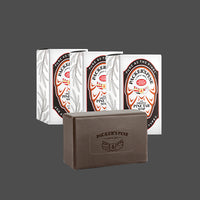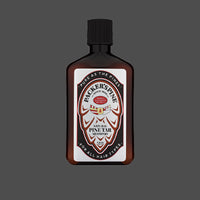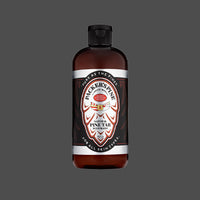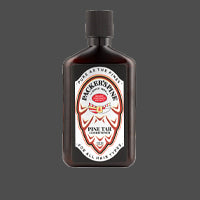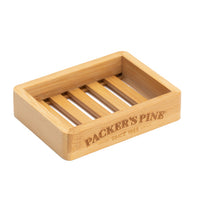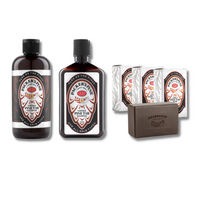Insect Bites and Stings: How to Stay Safe in the Forest

(Jimmy Chan/Pexels)
Packer’s Pine soap has been a favorite of outdoorsmen since its very inception. Made from pine tar, this soap packs a forest-scented punch that lets you become one with the woods.
As our product is derived from pine, Packer’s Pine knows how to spend time in the woods. One of the biggest complaints from people new to camping is the amount of bug bites they seem to get. Packer’s Pine has a few tips to keep you from itching and scratching all night.
1. Wear long sleeves and pants.
Yes, even in the summer and warm climates. Our clothing isn’t just to look pretty, you know! The best way to protect yourself from hungry (or angry) critters is to wear clothes long enough to cover your most vulnerable areas. The less access pests have to your body, the better you’ll feel. In warm climates, you may need to choose materials that can wick away sweat and keep you cool. Light colors can also reflect the sun’s light and keep your body out of the direct sunlight. This will keep you cooler than dark colors.
In areas with ticks, particularly the eastern half of the U.S., you may consider tucking your shirt into your pants and your pants into your socks. Ticks may be found anywhere between the ground and the treetops, but once they find a host, they tend to venture into areas like the armpits, knees, and groin. Tucking in your clothes keeps them from reaching those delicate areas.
2) Bug proof your tent
If you’re spending extended amounts of time outdoors, it helps to bug proof your tent, cabin, or hunting stand. Mosquito netting is an affordable, simple way to keep most of the mosquitos, flies, and wasps right where you want them: away from you! While netting won’t keep every insect away, it cuts down the number that can get close to you. This tip is especially effective in areas where humidity is high and plenty of standing water leads to lots of insects.
3) Use pine tar soap
One of the many benefits of pine tar soap is that it serves as an all natural insect repellent. Recipes for natural insect repellent using pine tar go all the way back to early pioneers, long before modern chemicals like DEET. Pine tar soap is a great DEET-free option that allows you to get clean while simultaneously applying a layer of bug repellent. When combined with other repellents, natural or synthetic, you get a multifaceted defense system that will keep you from itching.
Another benefit of pine tar soap is that it also soothes rashes, bites, and stings that you do happen to collect. In this way, pine tar soaps are a natural relief for rashes, itchy skin, and even psoriasis. The best part is that its all natural ingredients make it a perfect outdoor soap, suitable for use in the most rugged terrain without any risk of pollution.
4) Clean up
It turns out your mother was right, there’s never a wrong time to tidy up. Keeping your campsite clean will help you avoid attracting insects to the place you spend most of your time. Food, drinks, and even your latrine will attract flies, ants, bees and wasps, and mosquitos. One of the simplest ways to avoid attracting them is to put away any food that’s not being eaten, dig a latrine or answer nature’s call far from the campsite, and store your food in a car or a sealed container away from the campsite.
5) Get a fire going
Everyone loves a campfire, but did you know they can help repel bugs? Smoke is a natural bug repellent. A roaring campfire is best for morale and cooking hot dogs on sticks, but you can achieve similar results with even just a couple of tiki torches. While this method isn’t 100% effective, it does have a demonstrable effect in driving away many of the mosquitos looking to sink their mouthparts into your vein. One of the most popular ways to use this tip is with citronella candles, which contain lemongrass essential oils. These oils double up on the smoky protection and keep bugs far away from the candle.
What do I do if I get bit?
If you are spending extended amounts of time outdoors, you should check for bites, stings, and parasites like ticks regularly. Remove any parasites and use a soothing treatment like pine tar soap to relieve any itching or skin reactions and reinforce the protection of the pine tar. In the following days, you should monitor for signs of illness that can be carried by pests, like Lyme disease, Rocky Mountain spotted fever, or malaria. If you identify signs of illness, you should seek medical attention immediately. The best way to avoid these diseases is with a strong prevention strategy, so plan accordingly, especially in heavily wooded areas.
Packer’s Pine works hard to support our outdoorsmen by supporting the outdoors. Each year we donate to planting campaigns and the National Forest Foundation, ensuring that the forest and all the bugs in them will be around for the generations that follow. Get clean with Packer’s Pine natural soap and you can help protect the forests too.
Infographic
If you're planning a hike in the forest, you must be prepared for any potential insect bites and stings you may encounter. Having some pine tar soap on hand is one way to be ready for anything. Since the Middle Ages, people have used pine tar soap, a natural soap with anti-inflammatory properties, to ease the pain of bug bites.




